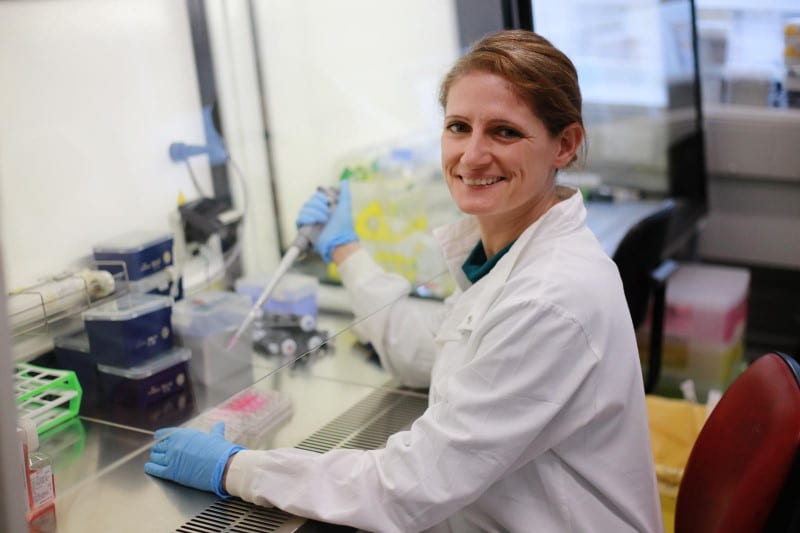COVID-19: Immune correlates of hyperinflammation and protective immunity in COVID-19
As we grapple with the nightmare scenario of a global pandemic, scientists around the world, including at Bristol, are diving into research around as many aspects of the COVID-19 virus as possible. One of the key findings to date is that in serious cases the body’s immune system goes into ‘overdrive’. Evidence accumulated so far suggests that the life-threatening COVID-19 complications are related to immune dysregulation, arising because of viral infection in the form of a hyperinflammatory syndrome accompanied by increased plasma levels of pro-inflammatory cytokines.(1-2)
Immunologist Dr Laura Rivino is conducting a pilot study that should provide us with a clearer understanding of the immune response underlying both the immunopathology and immune protection in patients with COVID-19. Her team’s hypothesis is that it would be beneficial to use a combination of strategies where the anti-inflammatory response can be blocked while simultaneously boosting the anti-viral immune response, with an expectation of ensuring viral clearance and establishment of immunological memory.
Effective therapeutics are now starting to emerge (3). Dr Rivino is seeking to understand the nature of the immune response in severe versus mild cases, to inform which patient groups might benefit from treatment with repurposed drugs. Several existing anti-inflammatory drugs are undergoing clinical trials for repurposing, but currently there is sparse evidence supporting the effectiveness of these therapies. Dr Rivino’s work in defining the immune profiles in COVID-19 patients across disease severities will help identify a possible approach to drug treatment.
Dr Rivino’s research was initiated because much more information is required to understand the mechanisms associated with increased inflammatory plasma cytokines and the interplay between the different immune cells during acute COVID-19. The immune profiles of patients are being studied longitudinally to not only evaluate potential therapeutic targets, but also record ideal windows of intervention to maximise efficacy while minimising interference with the development of protective immunity that is needed to clear virus-infected cells, as well as possibly for long-term protection to re-infection.
The research team started working in collaboration with Southmead Hospital Bristol, by first investigating the immune response in acute COVID-19 patients enrolled in the DIagnostic and Severity markers of COVID-19 to Enable Rapid triage (DISCOVER) study during the start of the pandemic and then by recalling – at measured intervals – patients who had been discharged, in order to take blood samples. When visiting these patients at the Southmead follow-up clinic Dr David Arnold and Dr Fergus Hamilton reported that over 70% of patients still had ongoing symptoms at 12 weeks post admission, now called ‘long COVID’.(4)
Speaking of her experience in researching the effects of COVID-19, Dr Rivino said: ‘The inflammatory aspect of COVID-19 is extraordinary and the kinetics of the response of T cells, a type of white blood cell that plays a key role in protection from viral infection, is intriguing. With most acute viral infections you see a fairly rapid peak followed by a drop of the T cell response but with COVID-19 the T cell response seems to be more prolonged and this is different to other acute viral infections. It is taking so long for patients’ immune systems to come back to baseline. And we’re also seeing this phenomenon known as “long COVID”, whereby patients can still feel unwell many months after they’ve been declared recovered. Does the immune response play a role in this? Research into this virus and what it does will be ongoing. We can now see antibodies and T cell responses developing during COVID-19, so we are presuming there’s immunity to the virus, but we don’t know how long for. Scientists will also want to start looking at people who’ve had COVID-19 and recovered and compare their immune response to people who’ve been vaccinated, once that vaccination programme is rolled out.’
Dr Rivino’s team is now also collaborating with Professor Nicholas Timpson and the Avon Longitudinal Study of Parents and Children(5 )(ALSPAC) group to study the immune response in younger people who had milder cases of COVID-19, in collaboration with colleagues Professor Adam Finn and Professor Linda Wooldridge.
Dr Rivino is expecting that the outcome of her team’s research will be to use the data generated linking immune profiles and disease outcomes to evaluate potential pathways of intervention to mitigate COVID-19 and to identify existing drugs that could target the identified pathways, as well as understand how inflammation influences the generation of long-term protective immunity.
References
1 Huang, C. et al. (2020) ‘Clinical features of patients infected with 2019 novel coronavirus in Wuhan, China’, Lancet, 395, p497-506.
2 Ruan, Q., Yang, K., Wang, W., Jiang, L. and Song, J. (2020) ‘Clinical predictors of mortality due to COVID-19 based on an analysis of data of 150 patients from Wuhan, China’, Intensive Care Med, 368, p1-3.
3 Horby, P. et al. (2020) ‘Dexamethasone in hospitalized patients with Covid-19 – preliminary report’
4 Arnold, D. T. et al. (2020) ‘Patient outcomes after hospitalisation with COVID-19 and implications for follow-up: results from a prospective UK cohort’, Thorax
5 Based at the University of Bristol, the Avon Longitudinal Study of Parents and Children (ALSPAC), also known as Children of the 90s, is a world-leading birth cohort study. It is the most detailed study of its kind in the world and provides the international research community with a rich resource for the study of the environmental and genetic factors that affect a person’s health and development.

